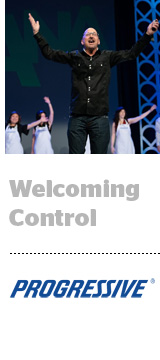
After years of banging the drum about gaining more control, transparency and efficiencies from service providers, marketers are doing it themselves.
Cost and speed to market are necessities for marketers struggling to drive growth, but too many third-party relationships often slow things down.
“Our current situation is unproductive, unsustainable, undesirable and untenable,” ANA CEO Bob Liodice said onstage during his opening remarks at the ANA Masters of Marketing conference in Orlando, Fla., on Thursday.
Seventy-eight percent of marketers surveyed by the ANA for a study released this month have an in-house agency, up from 42% in 2008. Sixty-five percent of those respondents said the in-house agencies’ workload has increased significantly over the past year.
“We, and I mean the collective we in this room, are taking back control of marketing to drive growth,” said Procter & Gamble Chief Brand Officer Marc Pritchard onstage.
Here’s a look at a few marketers taking control over their digital spend.
Taking control
Progressive Insurance was one of the early adopters of in-housing, standing up a media department next to its internal agency, 96 Octane, eight years ago. The firm brought media in-house because it wanted more control over how its money was being spent, said Jeff Charney, CMO at Progressive.
 “We saw there was a lot of activity that was very hard to make sure we had credible measurement for,” he said. “We wanted to figure out if we were getting exactly what we were paying for. A lot of times we were finding that we had question marks.”
“We saw there was a lot of activity that was very hard to make sure we had credible measurement for,” he said. “We wanted to figure out if we were getting exactly what we were paying for. A lot of times we were finding that we had question marks.”
That control has been crucial to Progressive’s growth, as it has fostered better measurement and sped execution, Charney said. Progressive’s marketing team can immediately change poorly performing TV spots or campaigns, rather than coordinating with an agency in a different time zone.
“I can go across the hallway say, ‘Wow, I worked so hard on one spot but it’s doing terrible,’” he said. “I can get the measurement that fast. Once you realize it’s the right context, you put money into it, and once you realize it isn’t, you can pull out fast.”
EBay’s decision to bring programmatic in-house four years ago was driven by desire for control over customer data and more efficiencies. The ecommerce platform has first-party data on its 175 million buyers and buys social, display and search internally, said CMO Suzy Deering.
“A lot of it is about data and efficiencies,” she said. “We can be more protective [over] our first-party data and make sure we’re targeting in a way that drives efficiencies and cuts down speed to market.”
And while genealogical site Ancestry hasn’t brought media buying in-house, it’s working directly with partners like Facebook and Google rather than having an agency intermediate the relationship, said global CMO Vineet Mehra.
“You just have more access to what’s changing,” he said. “Even those platforms are changing so quickly that the second you start putting people in between, you can’t keep up with it. Why not work direct and get access to the inside?”
Ancestry also cut ties with its creative agency to build an internal creative team that works with a mar tech team built around a customer data platform. The group also doesn’t have a digital agency because it has built an internal performance marketing team.
“More and more, we’re bringing things in-house,” Mehra said.
Agencies move offline
As big brands take more responsibility over their digital media executions, agencies are being relegated to large-scale, strategic initiatives centered around offline media spend.
EBay, for example, still works with media agencies, but typically only on offline channels, Deering said. Agency  partners will sometimes buy digital, but only if they’re endemic, non-programmatic buys. And with Ancestry working directly with Facebook and Google, its media agency, OMD, handles mostly offline mediaf
partners will sometimes buy digital, but only if they’re endemic, non-programmatic buys. And with Ancestry working directly with Facebook and Google, its media agency, OMD, handles mostly offline mediaf
Progressive doesn’t work with an external media agency at all. Although it has an internal creative agency, it retains Arnold for offline mass media campaigns and conceptual big idea development. Again, that decision comes down to control, Charney said.
“We can control the culture with an internal agency,” he said. “Arnold’s culture is similar to ours, but I can’t control it.”
While agencies may be losing their grip on digital execution, they’re still relevant in certain ways. OMD is a crucial partner for Ancestry, which spends about half its budget on offline media, in negotiating upfront deals.
“There’s a continuum of scale and control,” Mehra said. “We could buy linear TV in the upfront, but we’re much better off with OMD, which takes billions of dollars to the market.”
Agencies must embrace this new environment of brand oversight by adding value and helping brands through this transition, rather than fighting for that control back.
“I always felt like there was so much room for agencies to act in a more consultative ways,” Deering said. “Even if the buying practice comes in-house, having that nimble and objective view to the landscape can’t be underestimated.
“I don’t see it going so dramatically where there’s no future for agencies, but they have to evolve.”
This post was syndicated from Ad Exchanger.


More Stories
Scroll Media boosts in-game advertising with new feature
Kiwi filmmaker spotlights media struggles at top global awards
T-Mobile Has Appointed Kristin Harrer As Senior Vice President and Chief Brand Officer